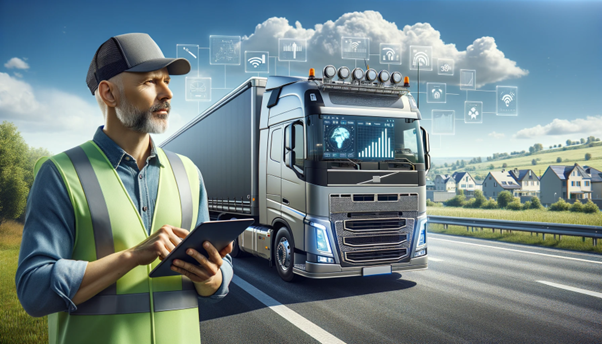The Evolution of Telematics and IoT in Fleet Management: Bridging Past Innovations with Future Potential
The integration of telematics and IoT has revolutionised fleet management, ushering in a new era of efficiency and innovation. With millions of GPS and wireless devices now tracking fleet vehicles and assets across various sectors, the industry is undergoing a significant digital transformation. The Internet of Things (IoT) acts as a bridge, connecting these devices and delivering actionable insights from vast amounts of data. When combined with advancements like Artificial Intelligence (AI), the potential benefits of IoT in fleet management are boundless, marking a pivotal moment in the industry's technological evolution.
Understanding Telematics in Fleet Management
Telematics in fleet management refers to the integration of telecommunications and informatics to facilitate real-time vehicle monitoring. This system combines GPS tracking with onboard diagnostics to provide detailed insights into vehicle usage, driver behaviour and maintenance needs.
Unlike traditional tracking systems, telematics enables a proactive approach to maintenance. Fleet managers can monitor precise odometer readings, receive diagnostic alerts, and address issues before they escalate. This approach enhances fleet efficiency, reduces operational costs and improves ROI.
Telematics is particularly impactful in areas like:
- Fuel management: Real-time monitoring of fuel consumption.
- Driver behaviour analysis: Insights into habits that may affect safety and efficiency.
- Route optimisation: Leveraging data to minimise travel time and fuel costs.
The Synergy of Telematics and IoT
The integration of telematics and IoT has amplified the scope of fleet management solutions, creating a more connected and data-driven ecosystem. IoT extends the capabilities of telematics by adding context to the data collected, making it actionable.
For example, IoT devices collect data on metrics such as:
- Fuel usage
- Engine performance
- Vehicle location
- Driver habits
- Maintenance history
This granular data, when processed, enables fleet managers to make informed decisions, improving fleet efficiency and operational effectiveness. Additionally, the affordability of IoT connectivity has driven its widespread adoption, making it an indispensable tool for modern fleet management.
The Role of IoT in Fleet Tracking
IoT has transformed vehicle tracking by providing seamless, continuous, and multi-dimensional capabilities. Real-time data transmission allows fleet managers to track vehicles more precisely and manage assets efficiently.
By 2025, the data generated by IoT devices is expected to grow exponentially, reshaping fleet management practices. According to industry reports, actionable insights derived from IoT data can reduce fuel costs by up to 15% and increase operational efficiency significantly
Key Benefits of Combining IoT and Fleet Management
Pairing IoT with fleet management technology offers numerous advantages, particularly in predictive analytics. Some key benefits include:
Improved Maintenance
IoT sensors enable condition-based monitoring, shifting maintenance practices from reactive to proactive. This approach reduces unexpected breakdowns and extends vehicle lifespans.
Enhanced Fuel Efficiency
Real-time fuel tracking helps reduce fuel wastage, significantly cutting operational costs.
Optimised Routing
Precision in location data facilitates better route planning, ensuring timely deliveries and minimising fuel consumption.
Driver Performance Monitoring
Continuous monitoring of driver behaviour enhances safety, reduces risks, and helps enforce best practices.
Streamlined Service Calls
Proactive alerts ensure timely service calls, reducing vehicle downtime and improving fleet availability.
Real-World Impacts of Telematics and IoT
The adoption of telematics and IoT in fleet management has delivered measurable results across industries. Businesses using these technologies report substantial reductions in fuel consumption and operating costs.
For instance, automation powered by IoT minimises manual errors and enhances service delivery. According to a study by Spherical Insights & Consulting, the global automotive IoT market was valued at USD 115.37 billion in 2022 and is projected to reach USD 975.66 billion by 2032, underscoring the rapid growth and significance of IoT in fleet operations.
Shaping the Future of Fleet Management
The future of fleet management lies in fully leveraging telematics and IoT to create more integrated, automated, and intelligent systems. As these technologies continue to evolve, they promise to deliver unprecedented levels of efficiency and sustainability.
Key advancements on the horizon include:
- Connected Vehicles: Offering seamless communication between devices and central systems.
- AI-Driven Analytics: Delivering deeper insights into operational data.
- Smart Fleet Systems: Enabling better resource allocation and decision-making.
Prolius: Transforming Fleet Management
Prolius is a leader in providing B2B software-as-a-service (SaaS) solutions tailored to optimise fleet management through cutting-edge telematics and IoT integration. Our platform empowers businesses to:
- Monitor vehicles and drivers in real-time.
- Reduce operational costs through predictive analytics.
- Ensure safety and compliance across fleets.
With Prolius, businesses can future-proof their fleet management strategies, enhancing both current efficiency and long-term reliability.
Conclusion
The integration of telematics and IoT has redefined fleet management, turning data into actionable insights that drive efficiency, safety, and innovation. As the industry moves toward more connected and automated systems, the role of these technologies will only grow.
With Prolius, companies can seamlessly integrate the power of telematics and IoT to unlock new possibilities in fleet operations. Elevate your fleet today to meet the challenges of tomorrow.
Learn more about how Prolius can transform your fleet management experience here.
